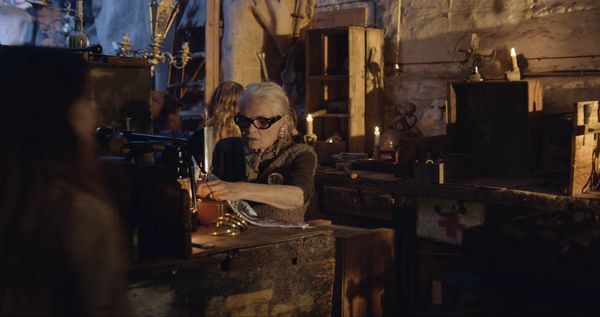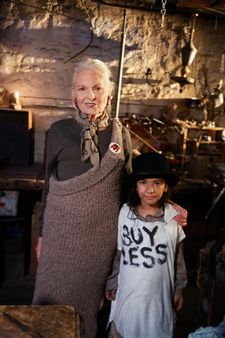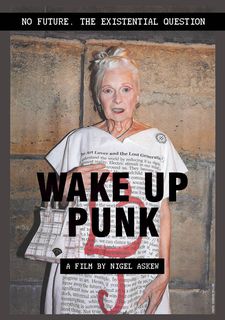 |
| "He was very much into Dickens" - Nigel Askew on Malcolm McLaren |
In November 2016, while London was holding an official celebration of the 40th anniversary of punk, Joe Corré, son of Malcolm McLaren and Vivienne Westwood, set fire to what he claimed was £5 million of punk memorabilia by the side of the Thames. It was a stunt which sparked outrage, not least within the punk community itself, but filmmaker Nigel Askew quickly came to suspect that there was more to it than had been immediately understood. Five and a half years later, his documentary, Wake Up Punk, is ready for release. It includes a lengthy interview with Joe about why he lit that fire, and it also calls on viewers to look beyond the nostalgia value of music and fashion and remember why punk mattered, and why it matters today.
 |
| Joe Corré in Wake Up Punk |
“It started with Joe being so angry about them celebrating because he had a dislike for Boris [Johnson], who was mayor at the time, and he just thought it was an outrage using his dad's name,” says Nigel when we meet to discuss the film. “Not many people could say much about it, but he could. So he decided to burn his collection, because it seemed like the thing to do, or a statement. So it started with his family's legacy and then it sort of followed along a little bit more of a personal story, due to the fact that we were just wanting to lay the record straight once and for all.”
That’s a simple way of summing up a very challenging process, not least because it’s impossible to talk about the history of punk without talking about Joe’s father, somebody who did enormously important things but badly hurt his son and was a difficult character. Nigel explains that he and Vivienne and Joe wrote the Dickensian scenes which frame the film as a way to give Malcolm a voice.
“I actually had to work quite hard to get him in because, obviously, he's not with us anymore,” Nigel explains. “So I used the kids’ voice through it because he was very much into Dickens. And that was where I used all the things where he thought of punk, like the situationists, you know? And obviously we had to come up with their family relationship, but we didn't actually set out, necessarily, to do that. I think it kind of evolved naturally, as documentaries can. But yeah, he was a difficult character, but you know what happens then you have brilliant people. I hope we represented him okay. I was a little bit worried when I saw the film that he didn't get a full say, because he couldn't get he really, he couldn’t get his point of view across, but he does through everyone else’s points, so there you go.”
Vivienne Westwood seems to be trying very hard to represent what he thought and even when she disagrees with him, she clearly still feels quite affectionate towards him. How did Nigel get such an intimate interview with her?
“You know, I think it's probably one of the best interviews I've seen,” he says in a tone which suggests curiosity more than pride. “It goes on for about five hours. And it was showing all the old clothing, all the old press cuttings, and the combination of them with her two sons having a family chat was what suddenly made her go relaxed. It was just the family chat of them talking about everything. She's never really spoken about Malcolm before – not in that way. She’s given the odd answer, but not to that extent.. You wouldn't get what I got, hours and hours of talking about everything. I think it was just the right moment, really, and quite lucky.”
 |
| The spirit of resistance |
Not just a series of talking heads, the film uses archive material to provide a more direct connection to the past, but this was complicated to acquire.
“When you’re making a punk film, most of the things have all been used, so I trawled through lots of punk films and tried to make it relevant to the story. We weren't allowed to use The Great Rock And Roll Swindle. That was difficult because Joe talks about it, so I tried to use something that hadn't been seen before. A lot of the archive stuff I’d shot as well, because I’ve been doing filming for a long time.
“It was very difficult actually. It's a bit of a minefield, especially when you haven't got permission from the Sex Pistols. You have to find out what other people have filmed and how to get that. I think that's probably the hardest thing when making a punk film. It’s just mind boggling.”
He also wanted to avoid indulging too much nostalgia.
“That’s what I tried to do because everybody's seen punk films again and again and again, with the music and the old art. So there isn't a point of view in that. I tried to take another look at punk, which is the political side and the attitude side, and bring it into nowadays. That’s what I was trying to achieve.”
Most people’s concept of punk now centres on a stripped back, corporate idea, I suggest. We don’t see much reference to the activism which was part of it, or to the climate activism which Vivienne was engaged in while the media was ignoring her in favour of the 40 year anniversary.
“Yeah, I think that people try to sideline her a lot and we really shouldn’t because I remember talking with her in the year 2000, and people thought she was crazy when she was going on about climate change, they thought she was a mad lady. And everyone was laughing. And now look. So I guess she's always been ahead of her time. I mean, Extinction Rebellion didn't exist when we started making this film. Fake News didn’t exist. A billion people writing about a story that never existed when they didn't know if it was true at all, they just wrote about it anyway. So I think she's always been an innovator, sort of moving ahead of the tide, pushing things forward ahead of everybody else. So yeah, it's a good thing that they can finally get their views out – obviously, they do get their views out in the film. It's not too much about nostalgia, as you say.”
We discuss his film’s different approach to the subject, and the fact that it doesn’t focus very much on the music.
“I purposely wanted not to do that, not to use all the usual things that everybody uses, because it is a much bigger thing than that,” he says. “And I just don't think anyone really has ever attempted this, for some reason. I don't know why. They’ve all gone down the Filth And The Fury type route, and it’s about time someone has, and now maybe other people will start making films like that, about the other side of it.”
The Filth And The Fury side of it is where the glamour is, I suggest – it’s a lot easier to market. He has little time for filmmakers who put that first.
 |
| Wake Up Punk poster |
“They're not being innovative, they’re not being interesting anymore – that’s my personal view. I’m more inspired by the punks in South America. It’s travelled all over the world. In Borneo they all have their heads shaved. It’s carried on all over the world, where punk has inspired people in different ways. It's a different mindset. We’ve seen punk from 40 years ago. We don't need to be told it again. I think the media have purposely, for commercial reasons, always gone to the side of the mohicans etc. and really sort of downgraded or forgotten all that intelligence and the political side of it and the inspiring side, so it's been a shame. They’ve tried to pigeonhole it into something that they've kind of made up which is sellable to the public.”
Joe's decision to burn the merchandise was the antithesis of that, I suggest. People argue that he should have sold it and donated the money, whereas it seems that he's trying to comment on the movement of money in that way being problematic in itself. What did Nigel think about the situation at the time?
“I thought it was bloody crazy,” he says. “Everybody hated him so bad. I've never heard of anything quite like it. He was just the most hated figure. But really he was following the true punk and doing exactly what Malcolm would have done, and I couldn't believe nobody got it. It took so long for them to pick up that he was pressing all their buttons, exactly what his father did. And he managed to fool them again!
“Whether he burnt it all I don’t know. It looked like it went up, to me. I think it was the only proper punk action that happened in that 2016 Punk Year celebration. It's the only thing that was punk about it. I went to a few events and it was just people looking at old pictures of themselves or a new book that talks about the past, so I think he was absolutely right to do it, and then he was in a position to do it, so he stood up to be counted. The stick he got for it, let’s be honest about it, was unbelievable.”
This extended, he says, to a lot of people involved in the original punk movement refusing to talk to him when he was making the film, “which actually worked to my advantage because we didn't have any of the usual suspects in the film.”
We discuss the sense of urgency in the film and how the issues society is facing today mean that punk is needed more urgently than ever.
“In a way, you know, the authorities hijacked punk and Vivienne and Joe hijacked it back. That was the right thing to do, to pull it back to something good. A force for good. That’s what it needs to be.”
Wake Up Punk will coming to select cinemas from 5 May and will be available On Demand from 9 May. Details here.





















